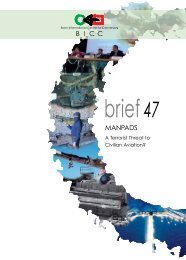egypt-final-presidential-elections-2012
egypt-final-presidential-elections-2012
egypt-final-presidential-elections-2012
You also want an ePaper? Increase the reach of your titles
YUMPU automatically turns print PDFs into web optimized ePapers that Google loves.
The Carter Center<br />
Announcement of Election Results<br />
The process of announcing the results of<br />
an election is one of the most sensitive<br />
tasks undertaken by an election authority.<br />
Authoritative, timely, and accurate election results<br />
significantly contribute to the perceived credibility of<br />
an election and reduce uncertainty in the postelection<br />
period. The timely and authoritative release of<br />
results after the first round of polling and before second<br />
round races is of particular importance for second<br />
round candidates’ campaigns.<br />
On May 28, <strong>2012</strong>, four<br />
days after the closing of<br />
the polls, the chairman<br />
of the PEC, Farouk<br />
Sultan, announced the<br />
results of the first round<br />
of the <strong>presidential</strong> election.<br />
Mohamed Morsi<br />
received the largest vote<br />
total, 5,764,952, or 24.8 percent of total valid votes<br />
cast. Ahmed Shafiq came in second, with 5,505,327,<br />
or 23.7 percent of valid votes cast. Hamdeen Sabahi<br />
received the next highest total number of votes with<br />
4,820,273, or 20.7 percent of valid votes cast. Given<br />
that only seven postelectoral appeals of the results<br />
were officially lodged, the PEC was able to announce<br />
the results within the prescribed time period.<br />
During the second round, over 450 appeals<br />
were reportedly lodged. The PEC stated that the<br />
announcement of <strong>final</strong> results for the second round<br />
would be delayed for another four days, until the<br />
commission had been able to adjudicate all second<br />
round postelectoral appeals. On June 24, <strong>2012</strong>, seven<br />
days after the closing of the second round polls,<br />
the PEC announced at a press conference the <strong>final</strong><br />
results of the <strong>presidential</strong> election. The chairman<br />
of the PEC, Counselor Farouk Sultan, spoke at<br />
length about the transparency and integrity of the<br />
PEC before providing details of many but not all of<br />
the reported 450 appeals lodged by both campaign<br />
teams and the details of their resolution. (The<br />
Center’s findings on electoral dispute resolution are<br />
included in a subsequent section of this report.) At<br />
the end of his speech, Judge Sultan announced the<br />
victory of Mohamed Morsi with 13,230,131 votes, or<br />
51.73 percent of the valid votes, to Ahmed Shafiq’s<br />
12,347,380, or 48.27<br />
percent of the valid votes.<br />
Given that there was<br />
suspicion among some<br />
Authoritative, timely, and accurate<br />
Egyptians that there<br />
election results significantly contribute to could be manipulation<br />
the perceived credibility of an election and of the results, the PEC<br />
reduce uncertainty in the postelection period. chairman’s detailed focus<br />
during the announcement<br />
of results on the<br />
<strong>final</strong> aggregation of<br />
electoral results as well as the process of adjudication<br />
of electoral appeals were important steps for boosting<br />
confidence in the fairness of the <strong>final</strong> aggregation.<br />
Nonetheless, the secrecy regarding the tabulation of<br />
<strong>final</strong> results in Cairo and the PEC’s opaque approach<br />
to resolving postelectoral appeals still invited allegations<br />
and suspicions about the process.<br />
Another controversy arose while the second round<br />
votes were being counted. The Freedom and Justice<br />
Party, the party of candidate Morsi, collected what<br />
they claimed were all 351 results sheets from each of<br />
the general committees, published them as a book,<br />
and distributed the book widely. This book included<br />
a spreadsheet, which the FJP claimed showed that<br />
Morsi received 882,751 more votes than his rival,<br />
Shafiq, in the second round, based on the totals<br />
announced at all district general committees. Some in<br />
Egypt felt this act was illegal, effectively an attempt<br />
61



